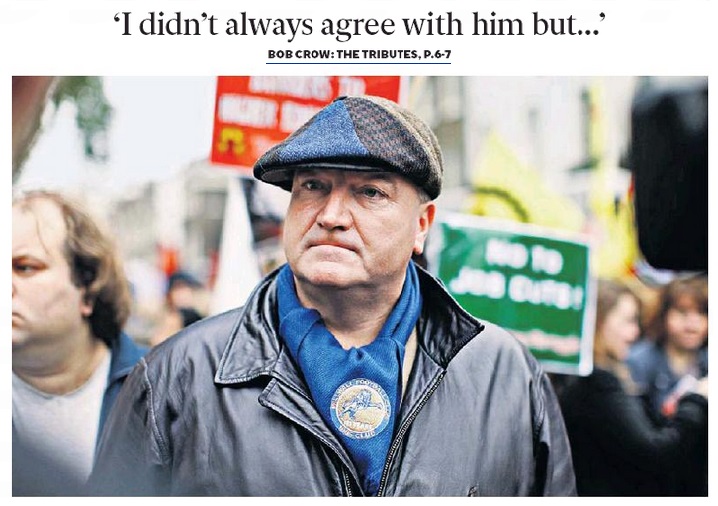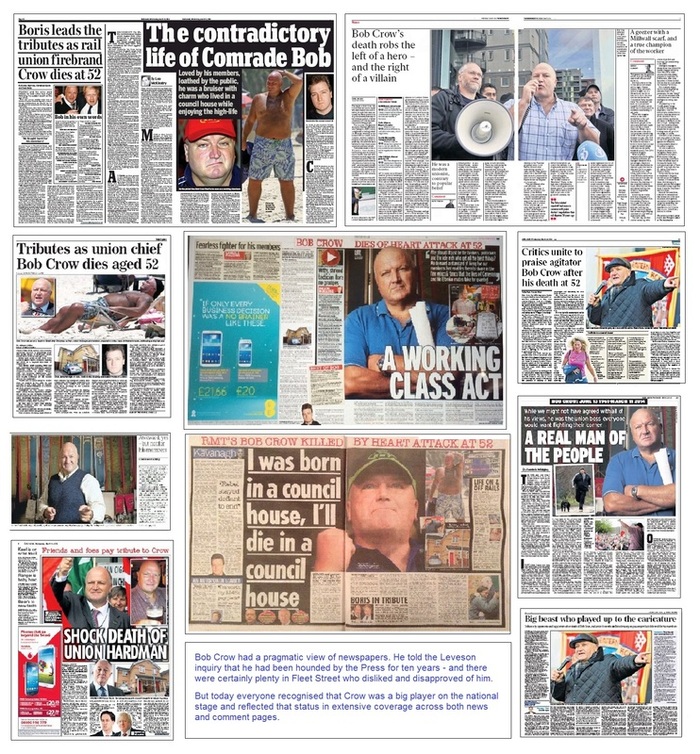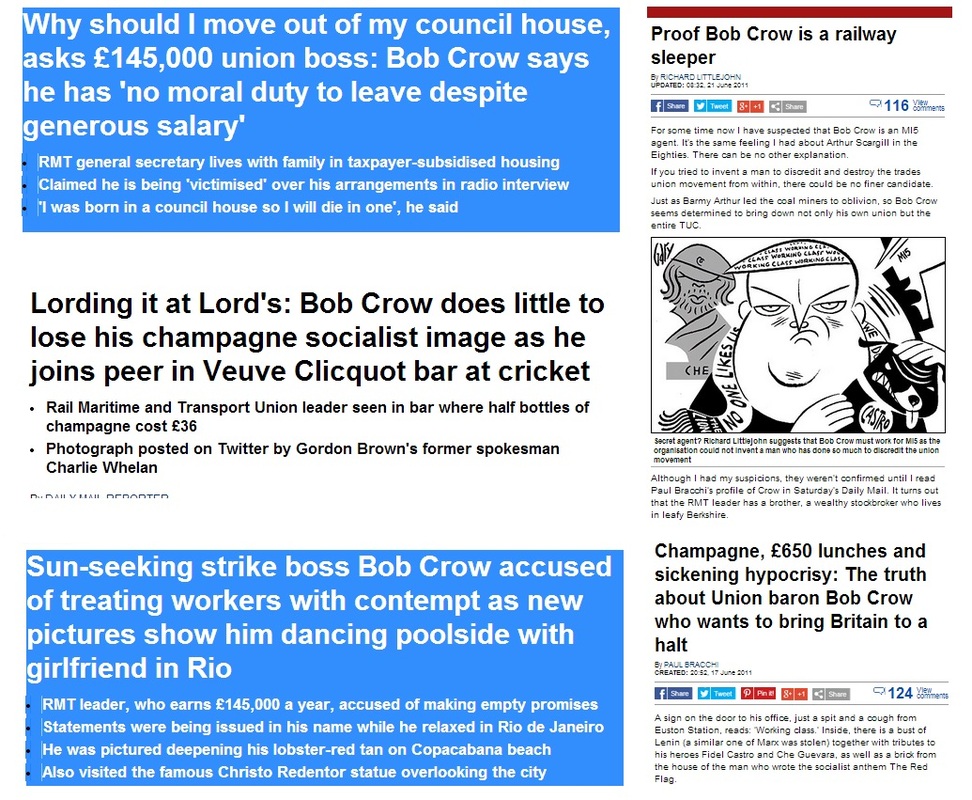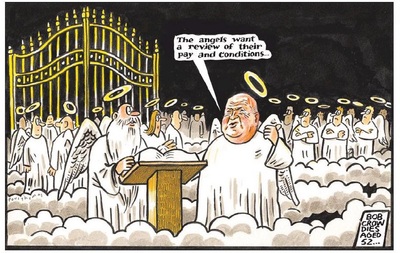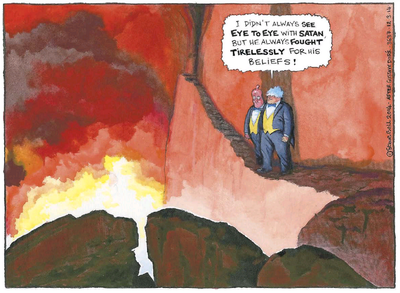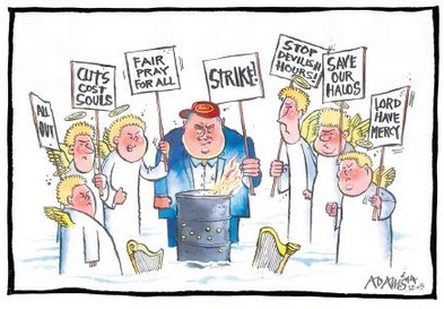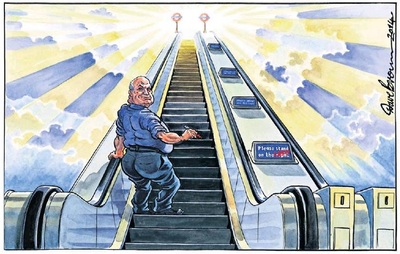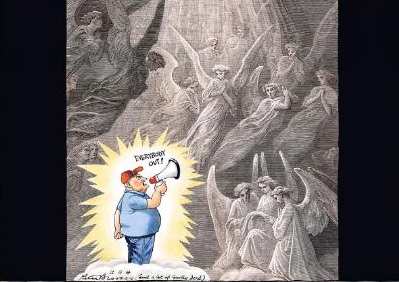Bob Crow wins his last battle with the media
In the kingdom of the bland the vilified man is king. Bob Crow made a career of being vilified; the rightwing tabloids' pantomime villain, the union leader who refused to give up his council house even though he was earning £145,000 a year, the 'champagne socialist' who dared to go on holiday or drink champagne in Mayfair to celebrate his fiftieth birthday. And in doing all these things he enlivened the public debate.
Hypocrite! the papers cried. But where was the hypocrisy? Did he ever preach that no one should be allowed a little (or even a lot of ) luxury in their lives? His mission was to try to make such treats available to the working class and not just the elite.
Crow's sudden death yesterday laid a hypocrisy trap for the self-righteous Press. Unless you are Hitler or Saddam Hussein, newspapers will generally be kind to you on the day you meet your maker. The knives may come out a day or a week later, but a level of restraint is customary on day one.
Crow himself showed no such restraint when Margaret Thatcher died last year, saying: 'I won't shed one single tear over her death. She destroyed the NHS and destroyed industry in this country and as far as I'm concerned, she can rot in hell.'
Newspapers today observed the conventions of courtesy, nimbly dodging the trap. Everyone recognised that Crow had been an important figure on the national stage and the extent of the coverage reflected that. The Independent front page (top) captured the tone perfectly with its headline "I didn't always agree with him, but..." paired with Crow looking belligerent in cloth cap.
Hypocrite! the papers cried. But where was the hypocrisy? Did he ever preach that no one should be allowed a little (or even a lot of ) luxury in their lives? His mission was to try to make such treats available to the working class and not just the elite.
Crow's sudden death yesterday laid a hypocrisy trap for the self-righteous Press. Unless you are Hitler or Saddam Hussein, newspapers will generally be kind to you on the day you meet your maker. The knives may come out a day or a week later, but a level of restraint is customary on day one.
Crow himself showed no such restraint when Margaret Thatcher died last year, saying: 'I won't shed one single tear over her death. She destroyed the NHS and destroyed industry in this country and as far as I'm concerned, she can rot in hell.'
Newspapers today observed the conventions of courtesy, nimbly dodging the trap. Everyone recognised that Crow had been an important figure on the national stage and the extent of the coverage reflected that. The Independent front page (top) captured the tone perfectly with its headline "I didn't always agree with him, but..." paired with Crow looking belligerent in cloth cap.
|
But there was no sudden rehabilitation. Neither the Express nor the Mail - which had been first in line to mock the cruise holiday just before Tube workers went on strike last month - mentioned Crow on the front page.
The Mail put its spread on 10 and 11; the Express ran the news story on 5 and a page of commentary further back. The picture choices were not friendly: a curled lip and a seaside shot for the Mail, a lounging on the beach image for the Express. The stories in each paper made the usual points about the high salary, the high life and the subsidised rent, although they were largely shorn of adverbs - as close to a mark of respect as the two papers were likely to come and quite a contrast to previous coverage. |
|
|
Crow had no reason to like the Press, and he recognised that he could never win. He told the Leveson inquiry that he had been followed by private detectives hired by the News of the World and the Mail on Sunday, that a Sunday Times freelance had rummaged through his dustbins and that he had been harassed by the Sun. The paper had once tried to prevent him going to work by parking its bus outside his house for a story that included the line "you stopped people getting to work this week, get a taste of your own medicine".
"Our trade union over the last 10 to 12 years has been the victim of a campaign of victimisation, harassment against not only me but officials," he said.
"Our trade union over the last 10 to 12 years has been the victim of a campaign of victimisation, harassment against not only me but officials," he said.
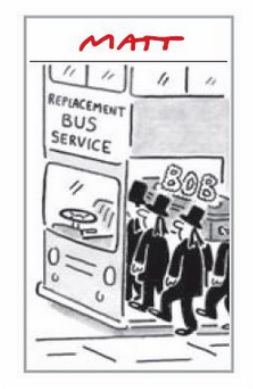 Matt in the Telegraph
Matt in the Telegraph
In an interview for the Guardian last month Decca Aikenhead repeatedly offered Crow the opportunity to hit back at the bad publicity over his Brazilian holiday. She wrote:
When he eventually explains why he thought it pointless to worry about how his holiday might play with the media, it's the only time he allows a glimpse of how deeply Fleet Street has hurt him.
"Well, if it weren't the Rio holiday they'd be saying something about 'Bob comes to work in jeans and a Fred Perry top.' If I'm walking around in a suit they go: 'Look at him, he's done well for himself walking around in a Savile Row suit, he should be wearing a Fred Perry.' They will use any argument they want to try and humiliate me, and try and make me basically look bad, and try and make me small."
Today they gave up that fight in favour of finding some redeeming features - as we expect in the final scene when the panto villain has been defeated. Commentators across the spectrum still focused on the inconvenience Crow had caused to commuters, but they also noted the wages he had delivered to his members, professing more admiration than disapproval. A train driver's pay doubled to more than £50,000 during Crow's 12 years in charge of the RMT. And in a time of declining union influence, his was one of the few to increase its membership, from 57,000 when he was first elected in 2002 to around 80,000 now. It is also independent of the Labour party.
Crow was not a fan of Tony Blair, of whom he said: "He squandered a massive landslide from an electorate hungry for change, poured billions of public pounds into private pockets and accelerated the gap between rich and poor." In 2003 the RMT's annual conference voted to allow branches to affiliate to other parties and some defected to Tommy Sheridan's Scottish Socialist Party. The following year the RMT became the first union to be expelled by Labour.
When he eventually explains why he thought it pointless to worry about how his holiday might play with the media, it's the only time he allows a glimpse of how deeply Fleet Street has hurt him.
"Well, if it weren't the Rio holiday they'd be saying something about 'Bob comes to work in jeans and a Fred Perry top.' If I'm walking around in a suit they go: 'Look at him, he's done well for himself walking around in a Savile Row suit, he should be wearing a Fred Perry.' They will use any argument they want to try and humiliate me, and try and make me basically look bad, and try and make me small."
Today they gave up that fight in favour of finding some redeeming features - as we expect in the final scene when the panto villain has been defeated. Commentators across the spectrum still focused on the inconvenience Crow had caused to commuters, but they also noted the wages he had delivered to his members, professing more admiration than disapproval. A train driver's pay doubled to more than £50,000 during Crow's 12 years in charge of the RMT. And in a time of declining union influence, his was one of the few to increase its membership, from 57,000 when he was first elected in 2002 to around 80,000 now. It is also independent of the Labour party.
Crow was not a fan of Tony Blair, of whom he said: "He squandered a massive landslide from an electorate hungry for change, poured billions of public pounds into private pockets and accelerated the gap between rich and poor." In 2003 the RMT's annual conference voted to allow branches to affiliate to other parties and some defected to Tommy Sheridan's Scottish Socialist Party. The following year the RMT became the first union to be expelled by Labour.
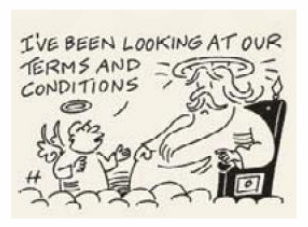 Haldane in the Times
Haldane in the Times
For many columnists, Crow's death provided the opportunity to let down the guard and confess to a sneaking admiration. Matthew Norman wrote in the Independent:
"A month ago, as he baked his torso to an appealing langoustine pink on Copacabana beach, the combative RMT leader was a thug, a dinosaur, a one-man extortion racketeer, and a rancid hypocrite who, not content with betraying his six-figure income by refusing to vacate his council house, brazenly sipped pina coladas on the eve of a Tube strike. By the simple expedient of a dodgy ticker, Bob Crow is reborn as a noble and principled warrior."
"A month ago, as he baked his torso to an appealing langoustine pink on Copacabana beach, the combative RMT leader was a thug, a dinosaur, a one-man extortion racketeer, and a rancid hypocrite who, not content with betraying his six-figure income by refusing to vacate his council house, brazenly sipped pina coladas on the eve of a Tube strike. By the simple expedient of a dodgy ticker, Bob Crow is reborn as a noble and principled warrior."
But it wasn't as simple as that; the very thing that made today's coverage interesting was that he wasn't reborn as a noble and principled warrior. The papers who regarded him as a thug and a dinosaur moderated their language, but not those opinions. What they did concede was that Crow was loved by members of the RMT - whereas last month he was 'treating them with contempt' by going on holiday.
Incidentally, it's worth pointing out that the only people who stood up to denounce Crow for that cruise were three Conservative MPs:
Hardly a wide range of critics - and it does seem a mite incongruous for Mr de Bois to be referring to those irresponsible Tube strikers as 'hardworking members'. As for the ordinary Londoners, vox pops carried out at the time found that commuters were generally sympathetic to the strikers, even though they had been inconvenienced.
Incidentally, it's worth pointing out that the only people who stood up to denounce Crow for that cruise were three Conservative MPs:
- Nick de Bois, Enfield, who said: ‘Bob Crow wants to plunge millions of commuters into travel misery while his only priority seems to have been to plunge himself into a Caribbean swimming pool. I hope his hardworking members will see through his hypocrisy.’
- Bob Neill, Bromley and Chislehurst, who described Crow as a champagne socialist and said that the word hypocrisy was an understatement; Crow was showing contempt for ordinary Londoners, he said.
- David Burrowes, Enfield Southgate, who wondered how Crow could be ready for personal meetings with Boris Johnson about the strike while he was sunning himself abroad.
Hardly a wide range of critics - and it does seem a mite incongruous for Mr de Bois to be referring to those irresponsible Tube strikers as 'hardworking members'. As for the ordinary Londoners, vox pops carried out at the time found that commuters were generally sympathetic to the strikers, even though they had been inconvenienced.
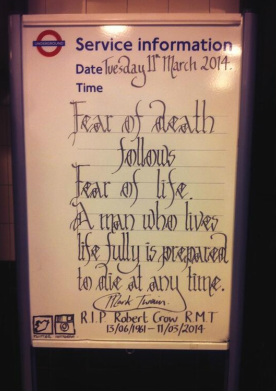 A tribute at Covent Garden Tube station
A tribute at Covent Garden Tube station
Trevor Kavanagh recognised this in the Sun today, writing:
"Bob Crow revelled in his tough guy image. With his burnished working class credentials, the East-Ender played up to his image as an old-style trade union dinosaur...Yet for all his endless strike calls, Bob Crow was much more subtle and successful than the wreckers who brought this country to the brink of anarchy. He knew when to fight — and when to sit down and talk.
Bob Crow embodied the trade union doctrine that nothing was too good for the workers. He revelled in the high life, frequenting the best restaurants, quaffing fine wines and sailing the South Seas while his members were on strike.They didn’t mind seeing him cavorting like an ocean-going plutocrat as long as he kept delivering the goods."
Both the Telegraph and the Sun carried leaders applauding his aspirational attitudes and his view that the good things in life should not be beyond the working class. A more likely supporter - George Galloway - made a similar point in the Guardian:
"Most people liked Crow because they knew he was authentic, in the age of the blow-dried speak-your-weight machine, and that he faithfully served the interests of those who elected him. He had no other master than them; and as the British ruling class used to say, he was the type of man with whom one could go shooting tigers...
His demonisation by the media was most striking because it didn't work. When it was not his wages, it was his holidays, or what he wore or what he ate or drank - pina coladas on a cruise being obviously too good for the workers. But Crow believed that nothing was too good for the workers - or their leaders - so long as the members approved. And approve of Bob RMT members surely did."
And so did the cartoonists
"Bob Crow revelled in his tough guy image. With his burnished working class credentials, the East-Ender played up to his image as an old-style trade union dinosaur...Yet for all his endless strike calls, Bob Crow was much more subtle and successful than the wreckers who brought this country to the brink of anarchy. He knew when to fight — and when to sit down and talk.
Bob Crow embodied the trade union doctrine that nothing was too good for the workers. He revelled in the high life, frequenting the best restaurants, quaffing fine wines and sailing the South Seas while his members were on strike.They didn’t mind seeing him cavorting like an ocean-going plutocrat as long as he kept delivering the goods."
Both the Telegraph and the Sun carried leaders applauding his aspirational attitudes and his view that the good things in life should not be beyond the working class. A more likely supporter - George Galloway - made a similar point in the Guardian:
"Most people liked Crow because they knew he was authentic, in the age of the blow-dried speak-your-weight machine, and that he faithfully served the interests of those who elected him. He had no other master than them; and as the British ruling class used to say, he was the type of man with whom one could go shooting tigers...
His demonisation by the media was most striking because it didn't work. When it was not his wages, it was his holidays, or what he wore or what he ate or drank - pina coladas on a cruise being obviously too good for the workers. But Crow believed that nothing was too good for the workers - or their leaders - so long as the members approved. And approve of Bob RMT members surely did."
And so did the cartoonists
